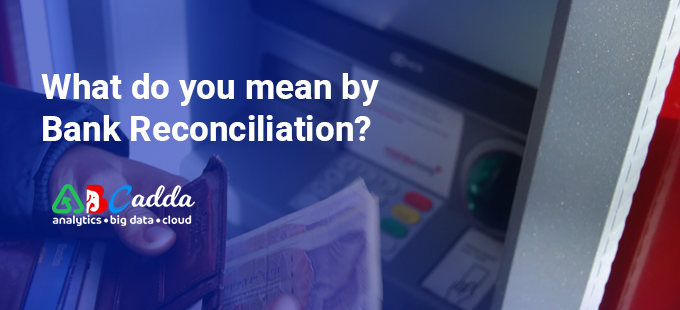Sometimes you might have come across any transaction which you can’t figure out or you might notice that you have more cash outflow than cash inflow and you are not able to find a solution to it. read more about What do you mean by bank reconciliation?
In both of the above cases bank reconciliation can be the best way out.
Bank Reconciliation is crucial as well as an easy bookkeeping process that guarantees that the total cash went through or earned matches the cash leaving or entering a record toward the finish of a financial period.
In simpler words, the invoices created by you matches with the payment received from the customer, and your expenses match with the outgoing payments. It is essentially the way toward coordinating the value-based information originating from a bank proclamation with the applicable inner organization information (recovered from the money account). The point is to confirm that every exchange in the bank explanation is predictable and practically identical to the inside records as introduced in the organization’s records.
What is the importance of Bank reconciliation?
It sounds tedious when one has to go through each transaction individually, but bank reconciliation is really important. A little effort and time of yours can protect you from long term losses. The bank reconciliation is a significant piece of an organization’s inside powers over its advantages. Before knowing the importance of bank reconciliation, one should know how bookkeeping is done.
Bookkeeping/accounting is a way of entering every exchange, regardless of whether on a bank articulation, financial record, or another source (money) and maintaining it in a proper sequence according to the actual time when the transaction is done. A month to month reconciliation can assist you with getting and recognizing any bizarre exchanges that may have brought about by bookkeeping mistakes, particularly if your business utilizes more than one bank account.
Reconciling your financial balance serves following fundamental needs:
- To keep the company’s records up to date and ensure that it is accurate.
- To verify that the Cash account balance is free of errors.
- To verify that the transactions noted in the bank account are error-free.
- To check whether there is any misrepresentation occurring before its past the point of rectifying.
- To ensure if your every exchange is being entered in your accounting system according to the respective dates.
- To verify is any expense is being duplicated.
- To ensure that there is no bad data entry.
If you’re acquainted with adjusting your checkbook, at that point you’re as of now acquainted with bank compromise. You’re mainly doing the same thing.
Why do we need bank reconciliation?
68.9% of business owners fear losing their business due to a lack of available cash. 58.2% of businesses identify slow-paying customers are the biggest challenge in managing their business. To summarize, cash is king. If you hold no cash that means your business cant survive.Three – quarter of businessmen feel that they don’t have sufficient money and that they need more cash.
By doing bank reconciliation at a regular interval, you will be able to know how much cash is present in your account. You will also know if the customer payments have bounced or failed or are there any bounced checks which have to be paid to your partners and suppliers. You will be able to catch bank errors if there is any. Keeping fraud aside bank reconciliation helps in reporting of tax and also in the periodic reporting that may be internal or external depending upon the type of firm.
How do you do bank reconciliation?
- First of all, you need to collect all your bank statements as well as the cashbook statement for the period you want to reconcile.
- Examine each transaction individually and thoroughly ensuring that the sums match perfectly with the bank statement and the cash flow statement and noticing any distinctions that seem unusual.
- You might come across a difference in the amount which might have happened due to timing or the customer hasn’t paid the amount or maybe the amount written is wrong. In case you are not able to figure out the difference contact your bank for clarification.
- Markdown the transactions like bank service charge or surplus charge, bounced cheque, and deduct it from your cash book statement.
- When the reconciliation is completed, your cash flow statement should match your bank statement.
While doing reconciliation, you should keep the following things in mind.
- Cheques that are duplicated or changed.
- Any unauthorized transactions that may be withdrawn or transferred in your bank account.
- If any data has been incorrectly entered into the account.
- Any incorrect amount that any employer might have posted in your account.
- Any transaction that has been done to an account with different account numbers or to the wrong account.
How often bank reconciliation should be done?
Many of the researchers suggest that bank reconciliation should be done at a regular interval, but it all depends on the size of your company. If you own a large company, then bank reconciliation can be done once on a 15 days basis, or if possible then getting it done weekly will be more advisable. Or else if you are a small company then reconciliation can be done once in a month.
